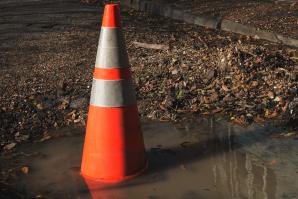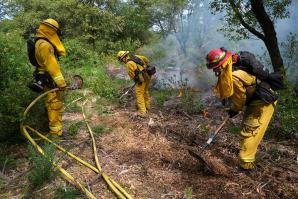Cindy Messer
Chief Deputy Director, California Department of Water Resources
Cindy Messer considers one of her greatest professional accomplishments also the toughest experience in her 23-year career.
Messer was sworn in as chief deputy director of the California Department of Water Resources the day after the Oroville Dam crisis began in February 2017, when damage to both the main and emergency spillways forced the evacuation of more than 180,000 residents. But within months, her boss retired, and she became acting interim director for the recovery phase. Today, Messer says she feels proud of her efforts to lead the department through this unsettled period and to engage residents warranted in their anger.
“I was the person to go out and be the face at the public meetings,” Messer says. “It was very important for me — I get choked up talking about it — to make sure that the public knew that the department (was) very empathetic to the fact that it was a very scary time; it disrupted people’s lives, it was a lot of uncertainty. We wanted to make a commitment that we were going to fix this, and we were going to do that in a short amount of time to make sure that next winter, folks were going to be safe.”
Raised in Pittsburg and Antioch, Messer’s interest in water developed during her childhood, with many weekends spent fishing with her dad in the San Joaquin River and going to Brannan Island State Recreation Area in the Sacramento-San Joaquin Delta. She earned her bachelor’s degree in environmental policy analysis and planning from UC Davis and her master’s degree in conservation biology from Sacramento State.
Click here to see the list of honorees in this year’s Women in Leadership issue
In 1997, Messer joined DWR as a scientific aide and soon progressed to environmental scientist. In 2005, she took on a supervisory role. “I love science, and I really admire the folks who do it, but it wasn’t necessarily my plan for the long run,” she says. “I’m a people person, so I thought, well, I’m going to try my hand at this.” In 2010, she became assistant executive officer for the new Sacramento-San Joaquin Delta Conservancy, charged with implementing ecosystem restoration projects. In 2012, she became deputy director of the Delta Stewardship Council, tasked with coordinating the preparation and implementation of the Delta Plan, a long-term comprehensive plan for the region. In 2016, Messer returned to DWR as assistant chief deputy director.
Messer, far left, with other Women in Leadership honorees. (Photo
by Rachel Valley)

Messer attributes her success to her grandmother, who emigrated from France to the United States in her 20s without knowing how to speak English. “She just set this really great example for me about work ethic and how to treat people, and how family is important,” Messer says. “A lot of my coworkers here, I call it my DWR family. It’s very important for me to have that element, and everywhere I have worked has had that. I try to generate it, but I’m also looking for it.”
–
Get all the profiles in our biggest-ever Women in Leadership issue delivered to your inbox: Subscribe to the Comstock’s newsletter today!
Recommended For You

Infrastructure Issues Demand Attention
Infrastructure — roads, bridges and dams — is the backbone of any economy. Business can’t function without it. The Association of Civil Engineers estimates that nationally, defective or failing infrastructure will cost the average family $3,400 a year over the next decade.

Got Storage?
California can't conserve its way out of a drought
Years of drought have baked away some of the divisions inside California’s Capitol, drawing opposing parties together in an effort to find solutions to the state’s ongoing water storage and conveyance problems.

Beating the Burn
California’s plan to deal with deadly and devastating wildfires — including controlled burns, thinning and a restoration economy — is ambitious; is the state up to the task?
Past approaches to forest fires have been a misinformed regime of fire suppression: extinguishing all flames quickly. Now California’s forests are overgrown tinderboxes-in-waiting; the approach is changing, but there’s a lot of work to do.




